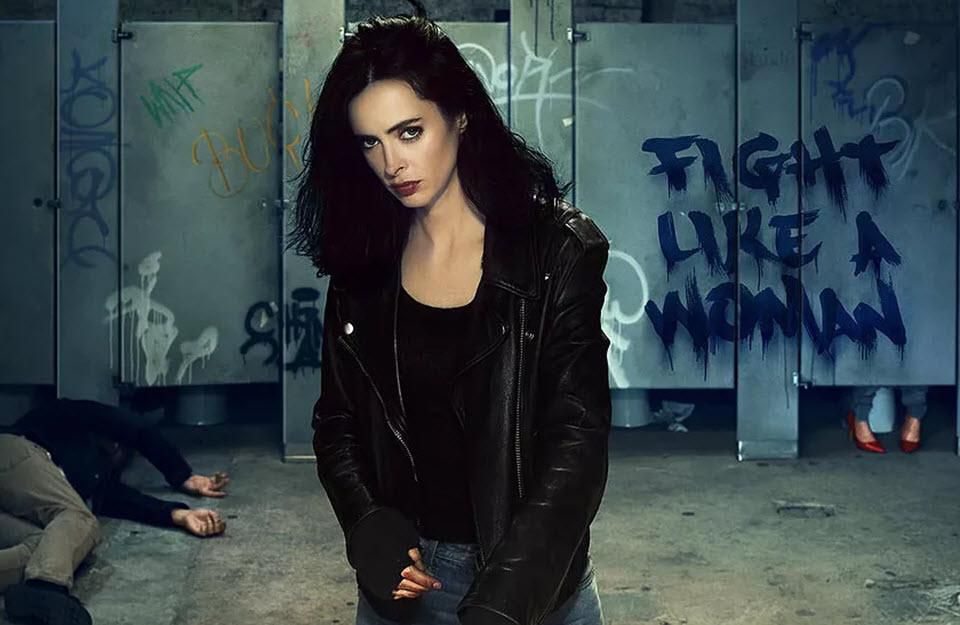Back in 2015 the first season of Jessica Joneswas released to critical acclaim and positive reviews. Part of what made the first season so praised was it’s engaging anti heroine and its use of a superhero story to examine issues like sexual assault, PTSD, and power. The recently released Season 2 continues this trend, with the key theme this season being addiction, or to be more exact, relapse. Whether it be bad behaviors, bad relationships or actual narcotics almost everyone in season 2 is on a backslide. Yes, the greatest twist of Jessica JonesSeason 2 might be that our hard drinking super powered PI protagonist was the most functional character this whole time. All of this can make the latest season a difficult watch at times, and it’s a testament to writing when you are frustrated by a character, not because they are acting out of character, but because their doing exactly what you expected them to do. Most of these characters also happen to be women. By the end of its second season every major female character in Jessica Jonescould be placed in the morally grey waters of an anti-hero.
Despite what common perception sometimes suggests, there has never been a shortage of ‘unlikable’ female characters. Going all the way back to pre-code cinema and femme fatales, ‘unlikeable’ woman have never been in short supply, but empathy for them has. Flash-forward a few centauries and modern television hasn’t always been kind to complicated women either. Back when the early examples of ‘golden television’ were still getting started, anti-hero protagonists included Walter White, a meth dealing maths teacher, Don Draper, a morally corrupt advertising executive and Hannah Horvath … an irritating twenty something? It’s here we need to acknowledge that in television ‘irritating’ and ‘morally heinous’ are often, one and the same to audiences, especially if the character in question is female. Breaking Bad’s, Anna Gunn found this out the hard way after receiving an outpouring of vitriol towards her ‘nag’ of a character, Skylar White. In 2013 the actress penned an op-ed piece in which she noted “At the end of the day, she hasn’t been judged by the same set of standards as Walter”.
Female lead shows are rare, but with the standards of what makes an ‘unlikable’ woman set so low, shows with empathy for truly complicated women are rarer still. Which brings us back to season one of Jessica Jones. Within the first season Jessica made some truly terrible decisions, but the show doesn’t judge her for it. It shows her as she is, messy, smart, lost, competent, right and wrong all at the same time. In the second season this complexity expands out to the rest of the female cast. Jessica’s former boss Hogarth, who spent much of the last season engaging in a number of duplicitous schemes, is given a far more emotional plotline while never losing her shark like edge. On the opposite side, and perhaps the most startling turn to anti-hero is Trish. In season 1 Jessica’s sensible polar opposite sister primarily filled the role of Jessica’s heart, the one person she actually cared about. The pedestal that season 1 set her on makes her fall all the harder, but the show never loses sight of the fact that Trish is an addict falling into old patterns rather than a ‘good girl’ taking a villainous turn.
And then there’s the season’s mysterious female villain, a not so subtle embodiment of repressed female rage (the show is sure to have her mention all the ways in which she repressed herself in her previous life). Rather than begin a build to a violent showdown between Jessica and this woman, the season twists into an examination of the complicated relationship between the two women. What exactly that relationship is will not be spoilt here, but it is certainly a relationship I have never seen depicted in this way on screen (although it is almost certainly a riff on a certain common moody male superhero trope).
However perhaps season 2’s greatest flaw is that the show does not always extend this understanding to its supporting cast. In one case it veers dangerously close to villainzing a woman, presumably so Jessica can supplant her romantically. The show barely pulls it back at the last minute, giving the character some level of humanity. This is disappointing because despite its protagonist’s prickly exterior, one of Jessica Jones’best qualities is its empathy. Every episode of season 2 was directed by a woman, and it shows. In season 2 Jessica Jones’commitments to telling stories about women, both at their best and their worst. Whether they be ‘likeable’ or not.
Louise Weaver
(Image: Forbes)

